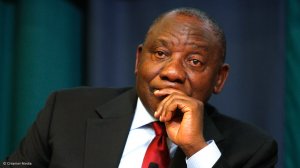Deputy President Cyril Ramaphosa has moved, just days before the convening of the African National Congress’s (ANC’s) policy conference, to reclaim the phrase ‘radical economic transformation’ from those who he said were misusing and misrepresenting it as part of a paid-for “publicity offensive”.
Speaking at the Gordon Institute of Business Science this week, Ramaphosa conceded that the term was “misunderstood”, also insisting that it did not represent “a new, uncertain path”.
“Radical economic transformation indicates a new phase of accelerated implementation of the long-standing economic policy positions of the ANC and government,” the Deputy President asserted, while acknowledging that the term was being deployed by some to either mask or justify activities that could be best described as State capture.
“We now know that some highly-paid PR specialists contrived a plan to use terms like ‘radical economic transformation’ and ‘white monopoly capital’ to launch a publicity offensive in defence of their clients. It was part of defining a new narrative where those who stood in the way of their clients’ interests were presented as being opposed to ‘radical economic transformation’ and representing the interests of ‘white monopoly capital’.”
Ramaphosa used his address to align the phrase strongly to the Freedom Charter and its call for the national wealth of our country to be “restored to the people”, as well as with the National Development Plan (NDP), which he noted had been adopted at the ANC’s Mangaung Conference in 2012 as the “overarching framework for the second phase of our democratic transition – the pursuit of socioeconomic freedom”.
The term, he asserted, was first used in the 2014-2019 Medium-Term Strategic Framework, which was adopted to guide the implementation of the NDP.
He said its introduction was meant to signal an intensification and acceleration of the economic transformation process and “not a break with existing policy”.
“Radical economic transformation is, in essence, about building a more equal society through sustained inclusive growth,” Ramaphosa averred, while urging stakeholders, including business, to get behind the programme.
However, a “new national consensus on a programme for inclusive growth” was needed and government, therefore, should place a "premium" on engagements and “consensus building”, which “in my book is the best way of taking this country forward”.
“We need to agree on a shared future – a shared future where we want a completely inclusive-type of growth, we want to see transformation – and if we agree and we lock our eyes on that, we are then able to say: ‘How do we get there?’”
Ramaphosa acknowledged that the country was going through political “turbulence”, but insisted that the “signposts” were pointing to an eventual exit from the turbulence.
“The governing party is going to go through its policy conference and that’s where policy certainty on a number of issues will come about. The signposts are also there in that, at the end of the year, the governing party is going to go through its five yearly national conference, where there will be a renewal of leadership, where there will be a renewal of the strength of the ANC, where it will come out united.”
The ANC policy conference will take place from June 30 to July 5 at the Nasrec Expo Centre, west of Johannesburg, while its fifty-fourth national conference will take place in Gauteng from December 16 to 20.
EMAIL THIS ARTICLE SAVE THIS ARTICLE ARTICLE ENQUIRY
To subscribe email subscriptions@creamermedia.co.za or click here
To advertise email advertising@creamermedia.co.za or click here










